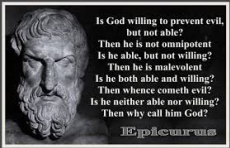

The Problem of Evil
Recap: Augustine’s viewpoint on the study of evil is largely based on teachings from the bible as he believed very strongly in its stories and teachings. Augustine took many teachings literally and proposed his theodicy to prove God’s existence as omnibenevolent, omniscient, omnipotent and to solve the problem of suffering and evil in this ‘perfect world’ that God has created. When discussing the topic of the problem of evil, there are two major assumptions, the first being that evil did not come from God since his creation is faultless and the second that evil having come from elsewhere God is justified in allowing it to stay.
How far does this solution solve the problem?
There are three main criticisms of Augustine’s theodicy; the logical error, the scientific error and the moral error. These criticisms question and reject Augustine’s ideas as well as identify the flaws in his theodicy.
The logical error written in the 19th century by Scheiermacher looks at Augustine’s contradictions. Scheiermacher firstly questions how a perfect world can go wrong. If God has given free will, and allows for humans to do bad and are free to fall, how is this a perfect world.’ A perfectly designed world cannot possibly have faults, yet Augustine states that a perfect world does have faults down to God’s creation. Scheiermacher stated that either the world was not perfect to begin with or that God allowed for the world to go wrong. This is a major flaw in Augustine’s theory.
When Augustine was asked why some angels fall, his response was that osme either received less grace or others were helped more to resist temptation. Both answers do not demonstrate God’s supposed quality of being all loving, again, identifying a contradiction made by Augustine. This is due to the fact that Augustine aimed to prove God’s omnibenevolence in his theodicy, yet suggests that not all of God’s actions are loving. Scheiermacher says that the creation was flawed as the allowance of the fall is a responsibility of God’s.
An even greater problem is the scientific error rejects Augustine’s belief in the teachings from the bible due to the modern views of the development of life in terms of evolution. Augustine blamed all evil, natural and moral on humans. Howeger, it is clear that natural evil, such as natural disasters are not connected with human sin. An example of a natural disaster being an earthquake, it is a random event which cannot be caused, prevented or stopped by humans. Therefore Augustine’s theory must be rejected on biological grounds. By being ‘seminally present’ in Adam, it does not explain why we get earthquakes, volcano eruptions and tsunamis.
The moral error addresses the topic of hell. “Hell,” the place which was designed as a punishment, to torture those who were sinful and did not repent their sins, by an ‘all loving God.’ In Augustine’s theory, he presents the idea that hell was part of the original design, this suggests that God has planned for things to go wrong. If God knew his perfect design would be a faulty, then he is not all powerful. If God didn’t know his perfect design would be faulty, then he is not all knowing.
Image- http://www.logicandlight.org/the-problem-of-evil/

0 Comment:
Be the first one to comment on this article.